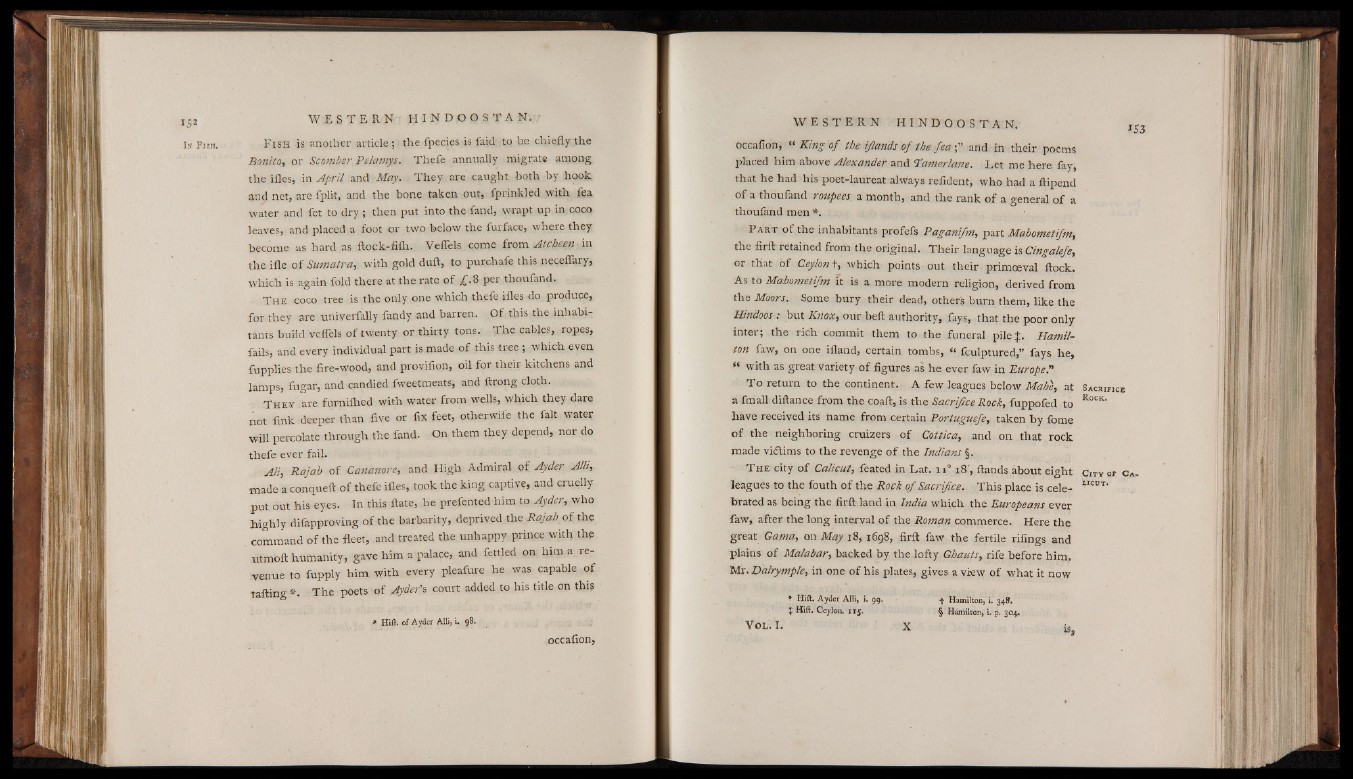
I n F ish . F ish is another article; the fpecies is faid to be chiefly the
Bonito, or Scomber Pelamys. Thefe annually migrate among
the ifles, in April and May. They are caught both by hook
and net, are fplit, and the bone taken out, fprinkled with fea
water and fet to dry; then put into the fand, wrapt up in coco
leaves, and placed a foot or two below the furface, where they
become as hard as ftock-fiih. Veflels come from Atcheen in
the ifle o f Sumatra, with gold duft, to purchafe this neceflary,
which is again fold there at the rate o f Jj • 8 per thoufand.
T h e c o c o tree is the only one which thefe ifles do produce,
for they are uniyerfally fandy and barren. O f this the inhabitants
build veflels o f twenty or thirty tons. T h e cables, ropes,
fails, and every individual part is made o f this tree ; which even
fupplies the fire-wood, and provifion, oil for their kitchens and
lamps, fugar, and candied fweetmeats, and ftrong cloth.
T hey are furnifhed with water from wells, which they dare
not fink deeper than five or fix feet, otherwife the fait water
will percolate through the fand. On them they depend, nor do
thefe ever fail.
Ali, Rajah of Cananore, and High Admiral of Ayder Alii,
made a conqueft of thefe ifles, took the king captive, and cruelly
put out his eyes. In this ftate, he prefen ted him to Ayder, who
highly difapproving of the barbarity, deprived the Rajah o f the
command o f the fleet, and treated the unhappy prince with the
utmoft humanity, gave him a palace, and fettled on him a revenue
to fupply him with every pleafure he was capable of
tailing *. The poets of Aydefs court added to his title on this
* Hift. of Ayder Alii, i. 98;
occafion,
occafion, “ King o f the ¡/lands of the fea ;” and in their poems
placed him above Alexander and ?'amerlane. Let me here fay,
that he had his poet-laureat always refident, who had a ftipend
o f a thoufand roupees_ a month, and the rank of a general o f a
thoufand men *.
P a r t of the inhabitants profefs Paganifm, part Mabometifm,
the firft retained from the original. Their language is Cingalefe,
or that of Ceylon f, which points out their primceval ftock.
As to Mabometifm it is a more modern religion, derived from
the Moors. Some bury their dead, others burn them, like the
Hindoos : but Knox, our bell: authority, fays, that the poor only
inter; the rich commit them to the funeral p ile j. Hamilton
faw, on one ifland, certain tombs, “ fculptured,” fays he,
with as great variety o f figures as he ever faw in Europe."
To r e t u r n to th e c o n t in e n t . A f e w le a g u e s b e l o w Mahe, a t Sacrim«
a fm a l l d i f t a n c e f r o m t h e c o a f t , is t h e Sacrifice Rock, f u p p o f e d t o RocK'
h a v e r e c e iv e d it s n am e f r o m c e r ta in Portuguefe, t a k e n b y fom e
o f t h e n e ig h b o r in g c r u i z e r s o f Cottica, a n d o n t h a t r o c k
m a d e v i c t im s to t h e r e v e n g e o f t h e Indians §.
T h e city o f Calicut, feated in Lat. iT 18', Hands about eight City or Ca.
leagues to the fouth of the Rock of Sacrifice. This place is cele- “ CUT‘
brated as being the firft land in India which the Europeans ever
faw, after the long interval of the Roman commerce. Here the
great Gama, on May 18, 1698, firft faw the fertile rifings and
plains of Malabar, backed by the lofty Ghauts, rife before him.
Mr. Dalrymple, in one of his plates, gives a view of what it now
♦ Hift. Ayder Alii, i. 99. 4 Hamilton, i. 348.
1 Hift. Ceylon. 115. § Hamilton, i. p. 304.
V o l . I. x